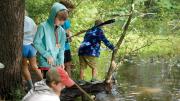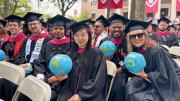Enzymes
Pallas Chou ’23
Senior English Address
I love enzymes. Tiny molecular machines, too small to be seen by the naked eye, they’re in each of our cells, performing important life functions like helping us breathe and allowing us to eat and digest yummy foods, like the warm Taiwanese beef noodle soup my mother makes, niuroumian, and the creamy New England Chowder my friends and I savor on Friday nights in the d-hall.
Enzymes perform these functions by bringing together different molecules in the cell, causing these molecules to interact with each other.
As a chemical and physical biology student, I spend a lot of time working with enzymes in the lab. There are so many different types of enzymes, each one with a different shape, color, and size and all serving different purposes that allow our bodies to function. When I first walked into Harvard Yard, I could never have imagined all the amazing people I would meet, hailing from Greece to Rwanda to Yemen to my hometown in California. Together, we would have late-night conversations and play “truth or truth,” learning about each other’s aspirations and grilling each other about romantic interests. My perspectives on different issues in the world have widened because of these incredible people from all over the world.
When you zoom into an enzyme, you’ll see that it has a unique structure that allows it to perform its function. The different creases and folds of an enzyme allow it to do what it does. For instance, a gap in the enzyme might be where a molecule fits and an extending branch of the enzyme might be where it grabs a molecule. Each crease, each fold, each loop, each bump, makes an enzyme perform really fascinating functions.
The structure of the enzyme is partly determined by the DNA that encodes it. Similarly, our individual characteristics are partly determined by the families we come from. My family, my DNA, has indeed shaped my upbringing. From teaching me that nothing is too small for me to be passionate about and that the library cards are the key to life, my family has formed a solid foundation of who I am.
However, an enzyme’s structure is not only determined by the DNA that encodes it. Other enzymes in the cell, as well as the surrounding environment, help shape the enzyme. From our first year to now, we have been together through ups and downs, shaping each other. We’ve scrambled for boxes, toilet paper, and mute buttons as the world was shutting down in 2020. We’ve lived through a pandemic that has reconstructed our perception of what education can be. We’ve comforted each other as we grieved the loss of loved ones. We’ve met inspiring professors who help us grow and classmates who are musicians, magicians, and mountaineers who never fail to encourage us. For many of us, it was a long journey to get here, to be sitting here today in the theater. And, today, we will celebrate.
Enzymes, although small, make reactions that are impossible, possible. By making possible the challenging intricacies of life, enzymes teach us that the boundaries of our abilities are limitless when we are shaped by those who care for us. Do not underestimate what we can collectively accomplish. Just as enzymes bring molecules together to catalyze chemical reactions, I have seen so many of you bring people together to catalyze change. As we leave Harvard, we will continue to shape and be shaped by the world around us, serving as enzymes of Veritas.





